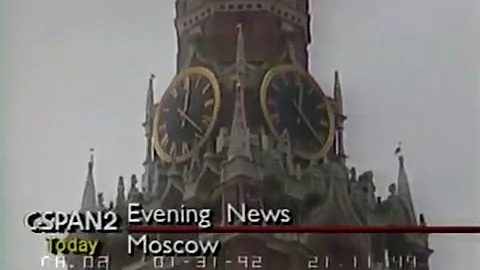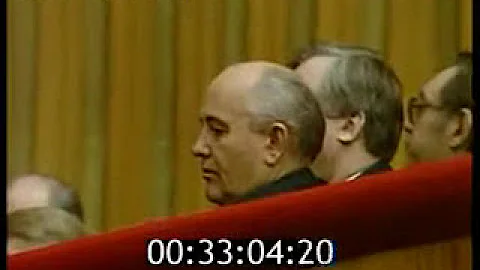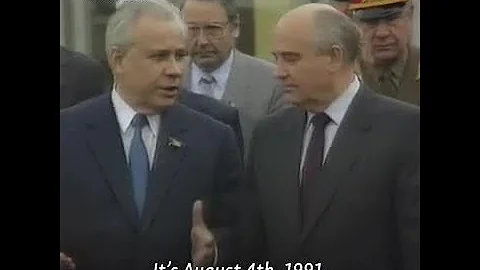In March 1990, The Soviet People's Congress passed the "Law on the Establishment of the President of the Soviet Union and the Amendment and Supplementary to the Constitution of the Soviet Union". The meeting decided to establish the President of the Soviet Union, the Supreme Leader of the Soviet Union Mikhail Sergeyevich · Gorbachev was elected as the first President of the Soviet Union.

Mikhail Sergeyevich Gorbachev
Like most Soviet leaders, Gorbachev also came from an ordinary family. In 1931, Gorbachev was born in a village called Prilivolnoye in the Stavropol Krai in the southern Soviet Union. Because his parents were working, he basically stayed with his grandparents when he was a child.
Gorbachev's childhood was unfortunate. From his birth to the end of World War II , Gorbachev experienced famine, political movements and wars one after another. The young Gorbachev not only had to work on the farm, but also endured the pain of hunger from time to time.
However, even so, Gorbachev still did not give up learning. When he was working on the farm, he always used his spare time to read and study. Therefore, in 1950, Gorbachev successfully entered Moscow Kromonosov State University to study law.
After graduating from university, Gorbachev did not stay in Moscow like other students, but chose to return to the border areas and work in his hometown.

Stavropol Territory
While everyone was puzzled by Gorbachev's decision, he was already doing well in his post in the Krai.
The Soviet Union has always adhered to the development concept of "heavy industry and light agriculture" . The country's development has always been based on industry, especially heavy industry. At that time, the Soviet Union encountered big problems with food. How to increase grain production without interfering with industrial development was one of the major issues facing the Soviet Union and the border areas at that time.
After Gorbachev took office, he immediately launched research on this issue. Perhaps because living and producing on the farm all year round brought him a lot of experience and thinking, Gorbachev quickly found a solution to the problem. With his efforts, the grain output in the border area has been increasing. Likewise, his official career has also been on the rise.
Relying on his achievements in agriculture, Gorbachev was appointed first secretary of the Stavropol Municipal Committee of the Communist Party of the Soviet Union in 1966. Four years later, he was appointed first secretary of the Border District Committee.

In 1978, Gorbachev’s mentor Kulakov died suddenly in Moscow. The Central Committee of the Soviet Communist Party decided to transfer Gorbachev to Moscow to replace Kulakov in charge of the Ministry of Agriculture. Just two years later, Gorbachev became a member of the Political Bureau of the Central Committee of the Communist Party of the Soviet Union, becoming the youngest Politburo member in the history of the Soviet Union. .
On March 10, 1985, Chernenko, the leader of the Soviet Communist Party who had only been in office for one year, died of illness. The next day, Gorbachev, who was only 54 years old, became the supreme leader of the Soviet Union.
The Soviet Union that Gorbachev inherited was already riddled with holes. During the Brezhnev period, in order to compete with the United States for hegemony, the Soviet Union put a lot of financial and material resources into the development of heavy industry and military industry, which led to the stagnation of domestic agriculture and light industry. Food, daily necessities, etc. that are closely related to people's lives are often in short supply. The common people of the Soviet Union lived in a superpower that was short of supplies.
On the other side of the ocean, in order to completely subvert the Soviet regime, the United States began to subvert the Soviet people's ideology as early as the 1960s, and continued to export "democratic" ideas to the Soviet people. This kind of pan-democratic and pan-liberal thinking in the United States has influenced a large number of Soviet people, and Gorbachev is one of them.

After Gorbachev came to power in 1985, he immediately began reforms. However, this reform was not a reform of the Soviet Union's fragile economy, but an attack on "alcoholism".
Most people in the Soviet Union were very drunk, and some even affected their normal work. In order to "rectify the national spiritual order" , Gorbachev decisively launched an anti-alcohol campaign.The anti-alcohol movement had good intentions, but it brought about a series of other problems: the closure of a large number of wineries, resulting in worker unemployment, the underground liquor trade leading to economic chaos, and the inability to purchase spirits, which led to public dissatisfaction with the government.
Seeing the country declining step by step, Gorbachev had to carry out economic and political reforms. However, his reform this time has taken a slightly bigger step.
In 1987, the Soviet Union decided to carry out economic system reforms, the main content of which was to expand corporate autonomy. A year later, the Soviet Union passed a decree allowing the establishment of private companies .
Gorbachev clearly realized that pure planned economy could no longer save the Soviet Union. However, "marketization" is not simply "privatization". Some industries related to national security and people's livelihood must be firmly in the hands of the state, otherwise a group of oligarchs will be spawned like Russia. Gorbachev's economic reforms not only failed to save the Soviet Union from collapse, but accelerated its collapse.

Politically, Gorbachev was committed to building a "new Soviet Union" . Influenced by Western trends of thought, Gorbachev has always advocated diversity of opinions and politics, gradually loosened the Soviet Communist Party's control over the central government, and believed that the authority of the Union and the republics should be re-divided.
In 1990, in order to further loosen the control of the Soviet Communist Party, the Congress of People's Deputies of the Soviet Union passed a resolution stipulating that the Communist Party of the Soviet Union no longer had a legal leadership position. At the same time, the Congress decided to establish the President of the Soviet Union and transfer state power from the Presidium of the Supreme Soviet of the Soviet Union to the President of the Soviet Union, and Gorbachev was appointed as the first President of the Soviet Union.
In terms of military affairs, Gorbachev made it clear that he hoped to stop the arms race with the United States and took the initiative to reduce military spending. In 1991, after multiple rounds of military negotiations with the United States, Gorbachev signed the Treaty on the Comprehensive Elimination of Intermediate-Range Nuclear Forces and the Treaty on the Reduction of Strategic Nuclear Weapons with then-President Ronald Reagan. The signing of these two treaties greatly reduced the fear that the United States and the Soviet Union were fighting for hegemony brought to the world.

Reagan
With Gorbachev's step-by-step reforms, the Soviet Union seems to be developing towards the "New Soviet Union" of his dream. However, when he looked back, he found that the Soviet Union seemed to be no longer under his control.
On August 19, 1991, Gorbachev, who was on vacation in Ukraine , was suddenly placed under house arrest. Vice President of the Soviet Union Yanayev announced that Gorbachev could no longer perform his duties as president due to illness. However, just two days later, Gorbachev regained control of the situation.
But after the August 19th incident, Gorbachev was no longer in existence. Although he is still working on concluding new alliance treaties with the member states, the member republics seem to be busy becoming independent. On December 8, 1991, Russia, Ukraine, and Belarus jointly signed the Treaty of the Commonwealth of Independent States and announced the dissolution of the Soviet Union. On the 25th, Gorbachev, who knew he was powerless, announced his resignation as President of the Soviet Union and transferred the power of nuclear weapons to Russian President Yeltsin . A superpower disappeared from the eyes of the world.

Yeltsin
Gorbachev, who left the Kremlin, struggled to survive on the government's monthly pension of 4,000 rubles. However, as Russia's domestic economic crisis intensified, the ruble depreciated so much that it was impossible to live on a 4,000 pension. As a result, Gorbachev began to change his career and became an actor.
In 1997, Gorbachev and his granddaughter endorsed Pizza Hut. Since then, Gorbachev has participated in more than 70 movies, and the role he played will always be the moment when he announced the disintegration of the Soviet Union.


![1950s Soviet Union Under Stalin [Colorized] (Part 1) - DayDayNews](https://i.ytimg.com/vi/b__Nx6CQ4kE/hq720.jpg?sqp=-oaymwEcCNAFEJQDSFXyq4qpAw4IARUAAIhCGAFwAcABBg==&rs=AOn4CLDycCh6mXtkcY8pWek3Tu_5cWnluw)


















